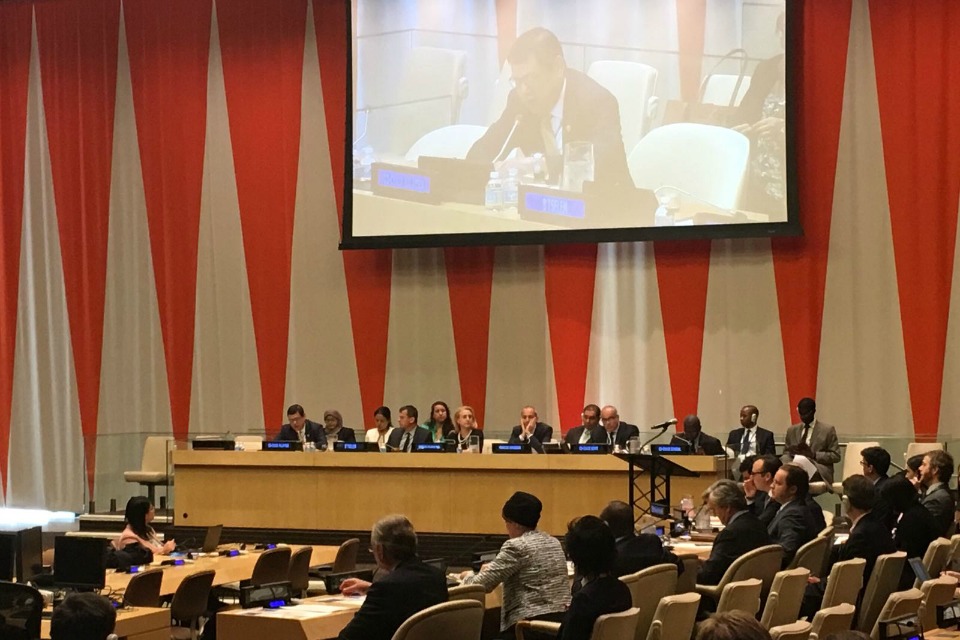Continuing Israeli settlement expansion in the West Bank is eroding the viability of the two-state solution
Statement by Ambassador Matthew Rycroft, UK Permanent Representative to the UN at the UNSC Arria Formula meeting on Israeli settlements

Thank you, and thank you to our co-hosts for convening this important meeting. And I want to thank our briefers from B’Tselem and Americans for Peace Now.
Look, this is a long running issue on the Security Council’s agenda. And I think what the briefers have done today is to confirm what is I hope a strong and shared conviction of the whole of the Security Council which is that every Israeli and every Palestinian has the right to live in peace and security, free from fear, free from violence. And it’s a shared conviction that the two-state solution is the best hope for a sustained, peaceful settlement to the Israeli-Palestinian conflict. And yet, as we have heard so clearly from the briefers, those aspirations remain distant, unrealised, and unfulfilled.
And there are clear obstacles to those aspirations being fulfilled. One is continuing violence. I’d like to reiterate at the start the British Government’s condemnation of the terrorist attacks in Jerusalem last weekend. We’re appalled by this wave of attacks against innocent Israeli civilians, as well as the praise shown by Hamas, among others, for those carrying out the attacks. Our thoughts and prayers are with victims and their families.
And this violence is directly undermining the prospects of a two-state solution. And it’s undermining what little trust remains between the two sides. And it simply cannot continue.
And a second sadly recurring obstacle to peace is the continued expansion of settlements. As the Quartet Report made clear in July, continuing Israeli settlement expansion in the West Bank is eroding the viability of the two-state solution.
Even since that report was issued, Israel has made several new settlement announcements, with over 1,000 new units proposed. As the British Minister for the Middle East, Tobias Ellwood, said, these policies “fundamentally call into question Israel’s commitment to the two-state solution”.
So we need to speak clearly and honestly today. Too many times we hear that “settlements are not the issue” and that is simply not the case. The expansion of settlements is illegal under international law. And settlements are also fundamentally detrimental to a future peace agreement, creating facts on the ground in advance of that agreement. Since the Oslo process began in 1993, the population of settlements has more than doubled, and the Quartet report estimated that the current settler population is now 570,000 people.
The continued growth of this population and the continued expansion of settlements only complicates the basis for any future agreement and undermines the geographical contiguity of a future Palestinian state.
But it also undermines Palestinian communities’ ability to develop socially and economically. In the West Bank, Area C comprises the majority of agricultural lands, natural resources, and land reserves. 70 percent of this area has been unilaterally taken for exclusive Israeli use. Of the area that remains, there are severe restrictions on the ability of Palestinian communities to develop their land: less than one per cent of building permits for Palestinians in Area C have been approved over the last five years.
Peace and prosperity so often go hand in hand; denying Palestinian communities their right to develop will only damage the prospects of both.
But this is only part of the problem. A lack of development is being further exacerbated by demolitions of Palestinian structures. This year it’s estimated that nearly 800 buildings have been demolished, displacing 1000 people, including 500 children. What hope then is there for the two-state solution when communities are simply removed from the map, when futures are literally bulldozed to the ground?
This is most clearly seen in the concerning demolition orders issued against the Palestinian village of Susiya and the Khan Al Ahmar School, East of Jerusalem. If these orders are carried out, they will have a terrible human cost on the 350 inhabitants of Susiya and the children of Khan Al Ahmar. Such orders could lead to the forcible transfer of these people, in violation of international humanitarian law.
So we again call on the Israeli government to stop the demolitions. Instead, let them provide a transparent, effective and legal route to construction. Let them allow Palestinians to build their schools, their houses; their places of worship – and in doing so - allow Palestinians to build a future that will restore faith and trust in the two-state solution.
Thank you.